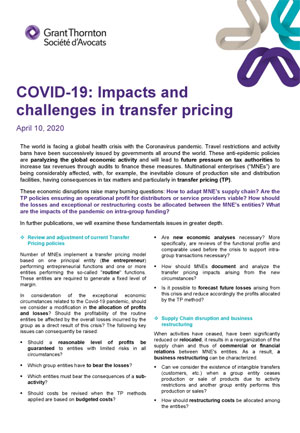-
Pilotage de la politique fiscale
Pilotage de la politique fiscale
-
Gestion de la croissance
Gestion de la croissance
-
Contrôle et contentieux fiscal
Contrôle et contentieux fiscal

-
Structuration stratégique et sécurisée des prix de transfert
Accompagnement à la définition d’une structuration stratégique et sécurisée des prix de transfert
-
Activités à l’international et Business restructuring
Accompagnement au développement des activités à l’international et aux réorganisations opérationnelles « Business restructuring »
-
Contrôles fiscaux en matière de prix de transfert
Assurer la défense des pratiques dans le cadre des contrôles fiscaux et de leur suite
-
Obligations déclaratives accrues et généralisées
Répondre aux obligations déclaratives accrues et généralisées

-
TVA domestique et internationale applicable à vos flux
TVA domestique et internationale applicable à vos flux
-
TVA bancaire et financière, TVA dans le secteur assurance
TVA bancaire et financière, TVA dans le secteur assurance
-
TVA immobilière et droits d’enregistrement (DE)
TVA immobilière et droits d’enregistrement (DE)
-
TVA dans le secteur public et associatif
TVA dans le secteur public et associatif
-
TVA, contentieux fiscal et relations avec l’Administration
Contrôle fiscal, contentieux fiscal et relations avec l’Administration fiscale
-
Règles applicables en matière de facturation
Règles applicables en matière de facturation
-
Problématiques douanières liées à vos flux internationaux
Problématiques douanières liées à vos flux internationaux
-
Obligations déclaratives et d’immatriculation à la TVA
Obligations d’immatriculation à la TVA et obligations déclaratives (TVA, DEB, DES)
-
Taxe sur les salaires
Taxe sur les salaires
-
Autres taxes indirectes
Autres taxes indirectes

-
Le Diag Transmission
Nous vous aidons à anticiper et appréhender votre opération de transmission

-
Stratégie de distribution
Mise en place et structuration de votre stratégie de distribution
-
Digitalisation des activités de distribution
Digitalisation des activités de distribution
-
Relations entre fournisseurs et distributeurs
Gérer vos relations avec vos fournisseurs et distributeurs
-
Politique contractuelle des entreprises
Mise en place et structuration de votre politique contractuelle
-
Contrôle et contentieux en matière de délais de paiement
Contrôle et contentieux en matière de délais de paiement
-
Relations commerciales avec les consommateurs
Organisation et sécurisation de vos relations commerciales avec les consommateurs
-
Droit des données personnelles - RGPD
Droit des données personnelles – conseil en RGPD
-
Baux commerciaux
Un accompagnement dans la gestion et le Contract Management des baux commerciaux.

-
Prestations traditionnelles
Prestations traditionnelles en droit social
-
Santé au travail et qualité de vie au travail
Assurer une plus grande souplesse dans l’organisation du temps de travail et améliorer la qualité de vie au travail
-
Audit du Management des Ressources Humaines
Auditer des prestations de service de la fonction RH au Groupe
-
Ingénierie RH & People Change
Mettre en place des réponses managériales en réponse aux enjeux stratégiques de l’entreprise
-
Gestion de la conformité RH et des enquêtes internes
Gestion de la conformité RH : harcèlement, discrimination et dénonciation…

-
Conseil dans la structuration juridique
Conseil dans la structuration juridique
-
Gestion courante des entreprises
Gestion courante des entreprises
-
Réorganisation d’entreprises
Réorganisation d’entreprises
-
Cession et acquisition d’entreprises
Cession et acquisition d’entreprises
-
Evolution de l’actionnariat – Emission de valeurs mobilières
Evolution de l’actionnariat – Emission de valeurs mobilières
-
Gouvernance et maîtrise des risques juridiques
Gouvernance et maîtrise des risques juridiques

-
Développement d’une politique de mobilité internationale
Développement d’une politique de mobilité internationale
-
Mobilité - Obligations déclaratives des salariés
Coordination des obligations déclaratives des salariés en situation de mobilité
-
Conseil en matière de sécurité sociale
Conseil en matière de sécurité sociale
-
Assistance en matière de droit du travail
Assistance en matière de droit du travail

-
La gestion et l’exploitation de vos portefeuilles de droits
Nous établissons avec nos clients la politique de protection de leurs droits de propriété intellectuelle la plus adaptée à leurs projets.
-
La sécurisation de vos projets : conseil et rédaction contractuelle
Conseil en matière de propriété intellectuelle, de droit de la publicité, politique contractuelle en matière de droit d’auteur et droit à l’image.
-
La défense de vos droits : précontentieux et contentieux
La défense de vos droits : détection des atteintes, précontentieux et contentieux

The world is facing a global health crisis with the Coronavirus pandemic. Travel restrictions and activity bans have been successively issued by governments all around the world. These anti-epidemic policies are paralyzing the global economic activity and will lead to future pressure on tax authorities to increase tax revenues through audits to finance these measures. Multinational enterprises (MNEs) are being considerably affected, with, for example, the inevitable closure of production site and distribution facilities, having consequences in tax matters and particularly in transfer pricing (TP).
These economic disruptions raise many burning questions:
How to adapt MNE’s supply chain? Are the TP policies ensuring an operational profit for distributors or service providers viable? How should the losses and exceptional or restructuring costs be allocated between the MNE’s entities? What are the impacts of the pandemic on intra-group funding?
In further publications, we will examine these fundamentals issues in greater depth.
Review and adjustment of current Transfer Pricing policies
Number of MNEs implement a transfer pricing model based on one principal entity (the entrepreneur) performing entrepreneurial functions and one or more entities performing the so-called “routine” functions. These entities are required to generate a fixed level of margin.
In consideration of the exceptional economic circumstances related to the Covid-19 pandemic, should we consider a modification in the allocation of profits and losses? Should the profitability of the routine entities be affected by the overall losses incurred by the group as a direct result of this crisis? The following key issues can consequently be raised:
- Should a reasonable level of profits be guaranteed to entities with limited risks in all circumstances?
- Which group entities have to bear the losses?
- Which entities must bear the consequences of a sub-activity?
- Should costs be revised when the TP methods applied are based on budgeted costs?
- Are new economic analyses necessary? More specifically, are reviews of the functional profile and comparable used before the crisis to support intra-group transactions necessary?
- How should MNEs document and analyze the transfer pricing impacts arising from the new circumstances?
- Is it possible to forecast future losses arising from this crisis and reduce accordingly the profits allocated by the TP method?
Supply Chain disruption and business restructuring
When activities have ceased, have been significantly reduced or relocated, it results in a reorganization of the supply chain and thus of commercial or financial relations between MNE's entities. As a result, a business restructuring can be characterized.
- Can we consider the existence of intangible transfers (customers, etc.) when a group entity ceases production or sale of products due to activity restrictions and another group entity performs this production or sales?
- How should restructuring costs be allocated among the entities?
Impacts on intra-group financing
Intra-group financing needs, including guarantee supports for loans granting by third parties, will be important. Over and above the necessary qualification of financial transactions as debt or capital according to their characteristics and purposes (cf. OECD Guidance on Financial Transactions of 11 February 2020), but also according to the borrower's repayment capacities and options realistically available to the borrower as well as to the lender, the current situation will require particular attention with regard to:
- The granting of intra-group loans;
- The management of cash flow needs;
- The set-up of a Cash-Pool;
- The need to issue intra-group guarantees.
Advance Pricing Agreements (APAs)
MNEs may be in the process of negotiating an APA or are currently applying such an agreement.
These rulings may become unenforceable because previous transfer pricing models are no longer adequate to the exceptional circumstances unforeseen at the time of the APA negotiation.
- Have the concluded APAs foresee a crisis like the current crisis among the citric hypotheses?
- How to adapt the terms and conditions of an APA to exceptional circumstances due to economic difficulties arising from Covid-19 crisis?
Should you have any question on these matters, please contact our experts.
Authors: Pascal Luquet, Partner, Attorney-at-Law / Mickaël Duquenne, Senior Manager / Nadia Boudaoud, Manager.
















